It’s that time of the month, time to assess the current GPU market and see what on earth is going on at the beginning of 2022. Throughout last year, GPU prices were the worst they have ever been, but there is some hope that this year will be better. To be fair, prices did get better throughout the second half of 2021 compared to the devastating peaks of May.
Of course, what everyone wants to know is if GPU prices are going to be better in 2022… and when. Not sure we’ll be able to provide that information for you just yet, but we will get into the pricing breakdown later in this article to see how January is playing out. Many factors are still affecting GPU pricing, from ongoing supply chain and global logistics issues to cryptocurrency mining remaining rather profitable. In this scenario, any adjustments to GPU pricing are going to be slow.
Nvidia’s New 12GB RTX Variants
To start this feature, we wanted to discuss the market situation from the perspective of a couple of new releases, namely Nvidia’s RTX 2060 12GB and the RTX 3080 12GB. Both GPUs were launched onto the market with little fanfare — and no firm MSRPs — creating a situation where Nvidia can extract the most they can from AIB partners they are sell these GPUs to. This, in turn, leads to high real street prices for GPU buyers.
The GeForce RTX 2060 12GB technically launched on December 7, but it’s been a hard to find product with limited supply. A month and a half on from its release, it’s clear that this GPU is not the savior of the mid-range GPU segment that some were hoping it would be. It simply isn’t available in high enough quantities to begin with, let alone at a reasonable price.

Most companies, including all the major AIBs, have RTX 2060 12GB models available, but when you head over to Newegg the only units you can buy are from third party sellers at ridiculously inflated prices, many of which are shipping directly from China like the MSI Ventus. Pricing starts at $740, which makes no sense considering you can find the the same Ventus variant as a 2060 6GB card for $620. Based on the performance difference between the two, there are zero gamers that should be interested in that product – and $620 is hardly a good price for a 2060 6GB card even in the current market.
This sort of pricing discrepancy is seen in other countries as well. In Australia you’re looking at $850 for the cheapest RTX 2060 6GB in stock versus $1,000 for the 12GB model, and you just wouldn’t pay that premium. The only way this GPU was going to improve the market was if Nvidia were pumping them out to increase supply and disrupt pricing in the mid-range, forcing prices to come down. But instead the opposite has happened, supply to retail markets has been limited and prices are even worse than existing GPUs, so it’s best to simply forget this card even exists. As we mentioned in our previous market update and in our RTX 2060 12GB review, we’ve been told from several sources that the 2060 12GB is mostly being produced and sold to miners.
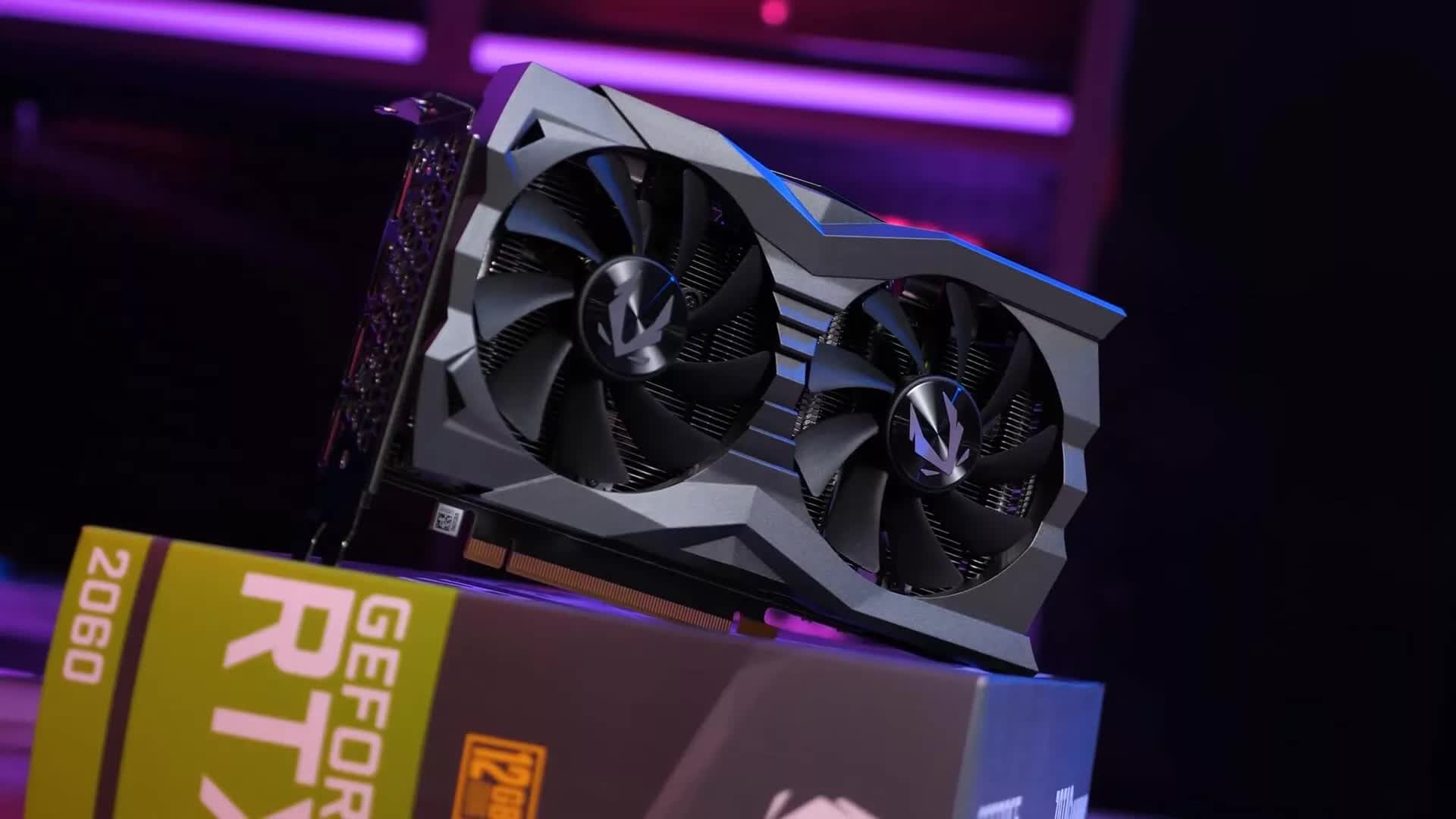
Then comes the GeForce RTX 3080 12GB, a GPU we described as a “shameless cash grab” that doesn’t help gamers whatsoever. Surprise surprise, after a quick look at the availability and pricing of this GPU in the week after launch, it does look very much like a cash grab from Nvidia to reset pricing on the RTX 3080, increase their margin and profit from the current market situation. By not providing an official MSRP for this product, they can raise the BOM price they sell this GPU package to AIBs, raking in more from each GA102 die compared to selling them as RTX 3080 10GB cards.
We’re not going over again why this is bad for gamers, you can get our full thoughts on the situation in our 3080 12GB review (coming soon). Instead, I want to look at where the new 12GB variant is sitting in the market right now.
No Shift, Whatsoever
Like with the RTX 2060 12GB, there are only a handful of RTX 3080 12GB models available on store shelves right now, the majority of available RTX 3080 offerings are the older 10GB card. Some people have suggested that the launch of the RTX 3080 12GB card will see the older 10GB card discontinued, and while I don’t want to rule that out, there’s no evidence to suggest that has happened so far — it’s simply too early in the lifespan of this new variant, and there’s plenty of existing 3080 stock to be sold before we can gauge what card is being resupplied in the highest quantities (though it’s definitely something we’ll be keeping an eye on).
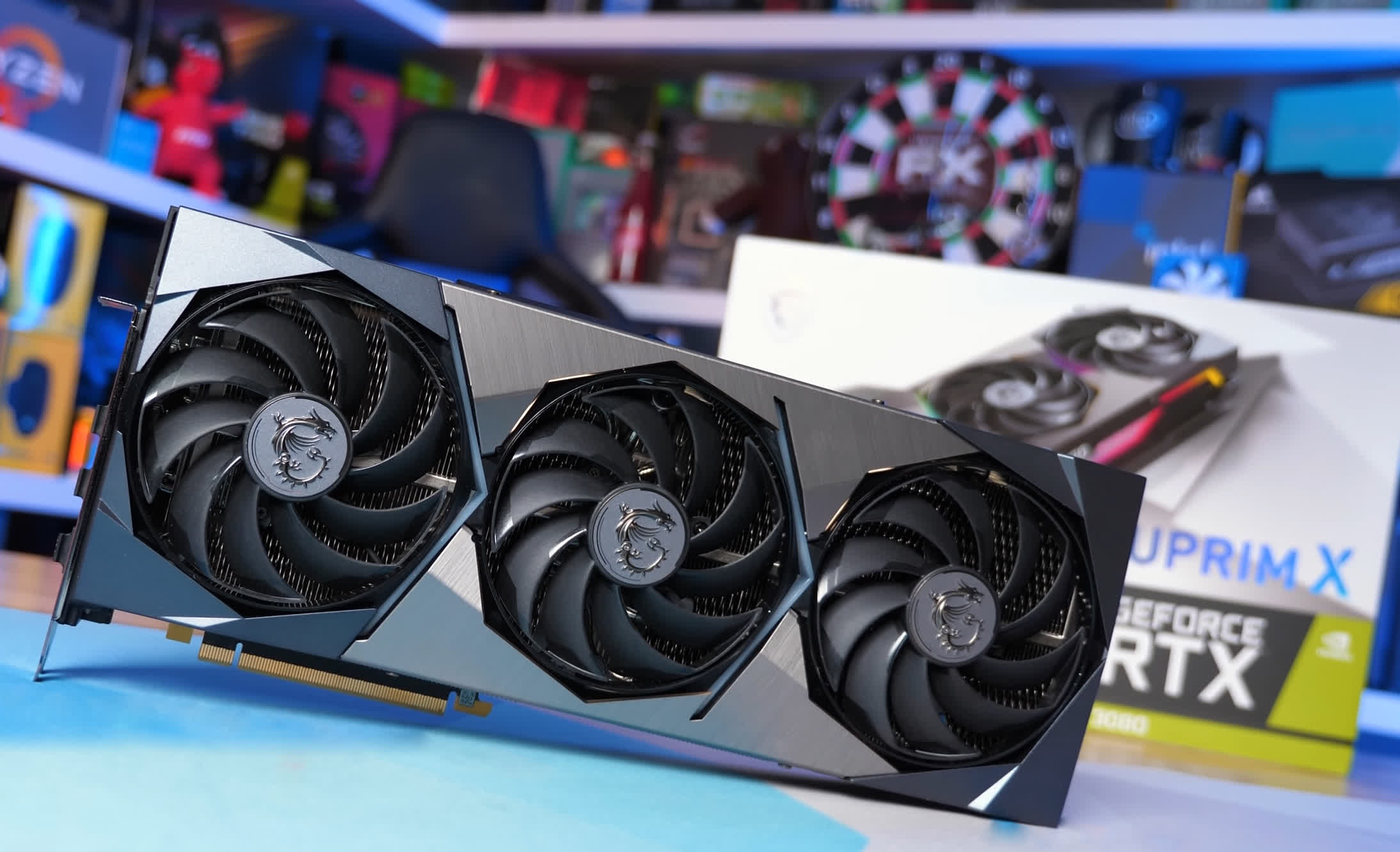
Pricing for the RTX 3080 12GB is disgusting at retail a week after launch. Newegg are sold out of these GPUs, but the cheapest listings have been around the $1,230 to $1,300 mark — higher than the supposed MSRP of the RTX 3080 Ti. Meanwhile, we have 10GB models going for just over $1,100 in the Newegg Shuffle and most 3080 Tis starting around $1,500. As expected, the 12GB variant is basically straddling that middle point between the existing 3080 and 3080 Ti.
Similar story in other markets. We’ll focus here briefly on Australia and the Asus ROG Strix model, we’re looking at $2,600 AUD for the 10GB 3080, $2,900 for the 12GB 3080 and $3,200 for the 3080 Ti model. MSI’s Suprim X is another example, $2,400 AUD for the 10GB 3080, $2,600 for the 12GB 3080 and $2,900 for the 3080 Ti.
The two latter cards, the 12GB 3080 and the 3080 Ti, were both announced well after the original RTX 3080 and clearly are being sold at a much higher price, and of course, all of that silicon could be being sold as regular RTX 3080s if Nvidia really did want to help out gamers and fulfill their launch day orders and keep to what they advertised. But they’re a corporation and these subsequent GPU releases are all about maximizing profits.
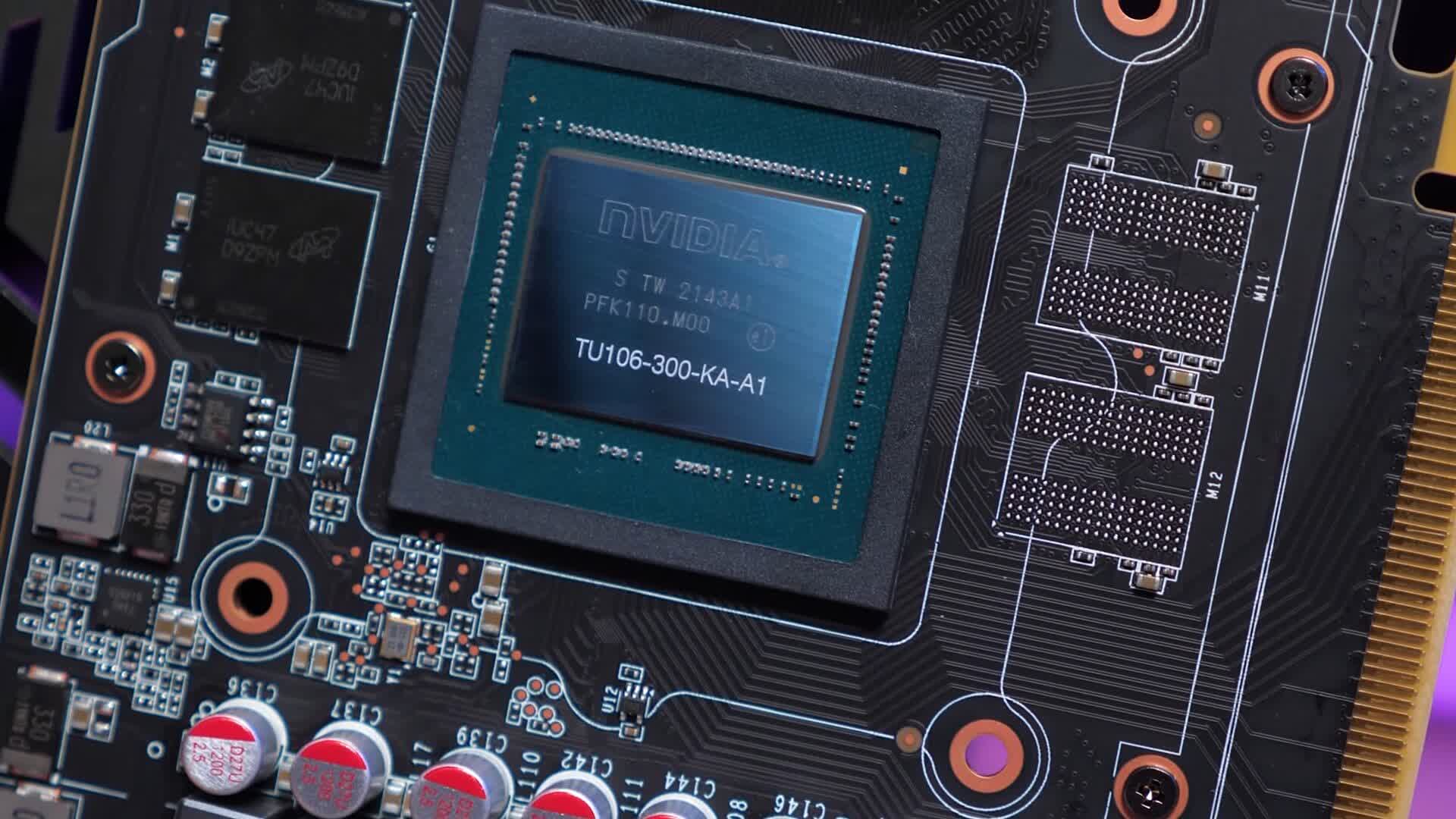
Are there any positives takeaways out of these launches? There are not many, but it’s been good to see these new releases not just sell out instantly at a lot of retailers. The reception from gamers over the RTX 3080 12GB has been lukewarm at best, and at the advertised prices they are not flying off shelves. In fact, these days at a lot of retailers outside of the US, cards have been available at high prices for months and months. This new 12GB launch is just another card joining that pile. The lack of an attempt to create an MSRP or sell GPUs at the MSRP has basically caused that situation, mostly for the worse.
GPU Pricing Update
What is the current situation with the scalper market? As we know, the crypto market and the GPU scalper market are closely linked, GPU prices are correlated to the profitability of mining on those GPUs at a given time, factoring in a bit of a lag as the market adjusts, predictions on time to profitability for buying a card and so on.

The price of Ethereum, and most other coins for that matter, have continued to fall throughout January, continuing a trend that began in the first week of November. Ethereum difficulty as a general trend continues to rise month on month, but at a slower pace than in the middle parts of 2021, so there’s been somewhat of a cool off in adding new hardware for mining. All up, when we look at Whattomine’s profitability data, most GPUs have fallen in mining profitability by around 15% month on month, which is a higher decline in profitability than last month.
Nvidia GPU Pricing Trend 2021-2022
Average Sale Price of eBay Completed Listings, New Products, 3rd Week of Month
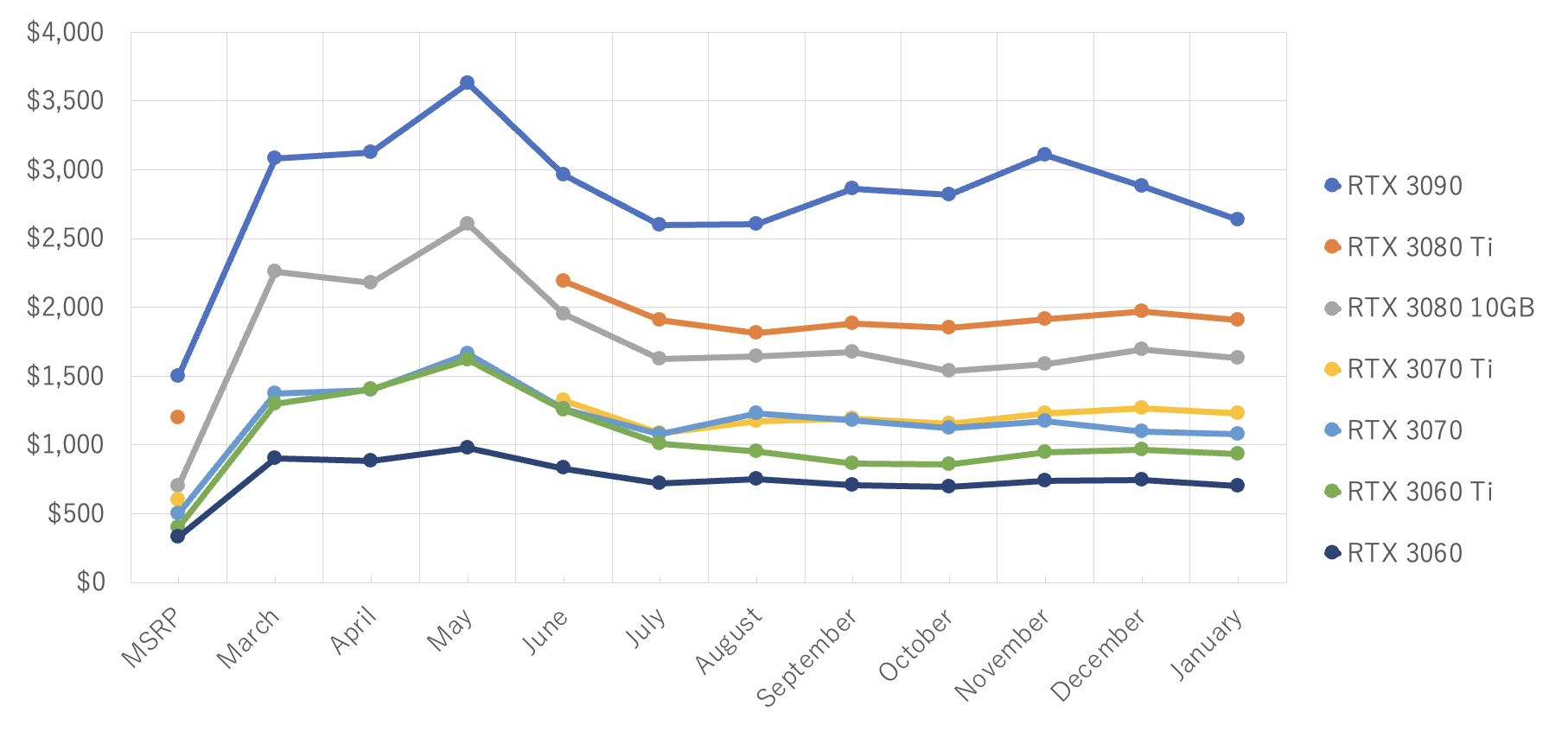
When mining profitability falls over a prolonged period, so do the prices of GPUs on the scalper market. Using our tried and true eBay completed listings metric for the same week in every month, Nvidia GPU prices have fallen by 4% on average, with every GPU in their current lineup seeing a small price reduction. I should note that the RTX 3080 12GB hasn’t hit the scalper market in a significant way yet to be included here, though we’ll be looking at adding it in future months.
| MSRP | eBay Average Price November | eBay Average Price December | eBay Average Price January | Current Price Inflation | Price Increase Dec to Jan | |
|---|---|---|---|---|---|---|
| GeForce RTX 3090 | $1,500 | $3,107 | $2,882 | $2,638 | 76% | -8% |
| GeForce RTX 3080 Ti | $1,200 | $1,916 | $1,968 | $1,908 | 59% | -3% |
| GeForce RTX 3080 | $700 | $1,584 | $1,693 | $1,633 | 133% | -4% |
| GeForce RTX 3070 Ti | $600 | $1,227 | $1,268 | $1,226 | 104% | -3% |
| GeForce RTX 3070 | $500 | $1,170 | $1,099 | $1,077 | 115% | -2% |
| GeForce RTX 3060 Ti | $400 | $946 | $965 | $935 | 134% | -3% |
| GeForce RTX 3060 | $330 | $739 | $747 | $704 | 113% | -6% |
| Average | 105% | -4% |
Across the data we’ve been collecting for months now, January has been one of the better months for Nvidia GPUs. Prices were flat on average in December, increased 6% month on month in November, and declined slightly in October. What we’re seeing in January is the largest decline in current-gen Nvidia GPU prices since July, and for some products like the RTX 3070 and RTX 3060, street prices are close to their lowest point in the period we’ve been capturing data. Inflation remains high, most Nvidia GPUs are still double their MSRP, but we think it’s important to mention the positives as well, like how GPU prices have fallen significantly since they peaked in May.
Also, since we’ve been collecting this data, January had one of the highest rates of listings going unsold for Nvidia GPUs, suggesting that some of the high prices seen on the scalper market are being less tolerated now than in previous months, which should lead to further price reductions in the future if that trend continues.
AMD GPU Pricing Trend 2021-2022
Average Sale Price of eBay Completed Listings, New Products, 3rd Week of Month
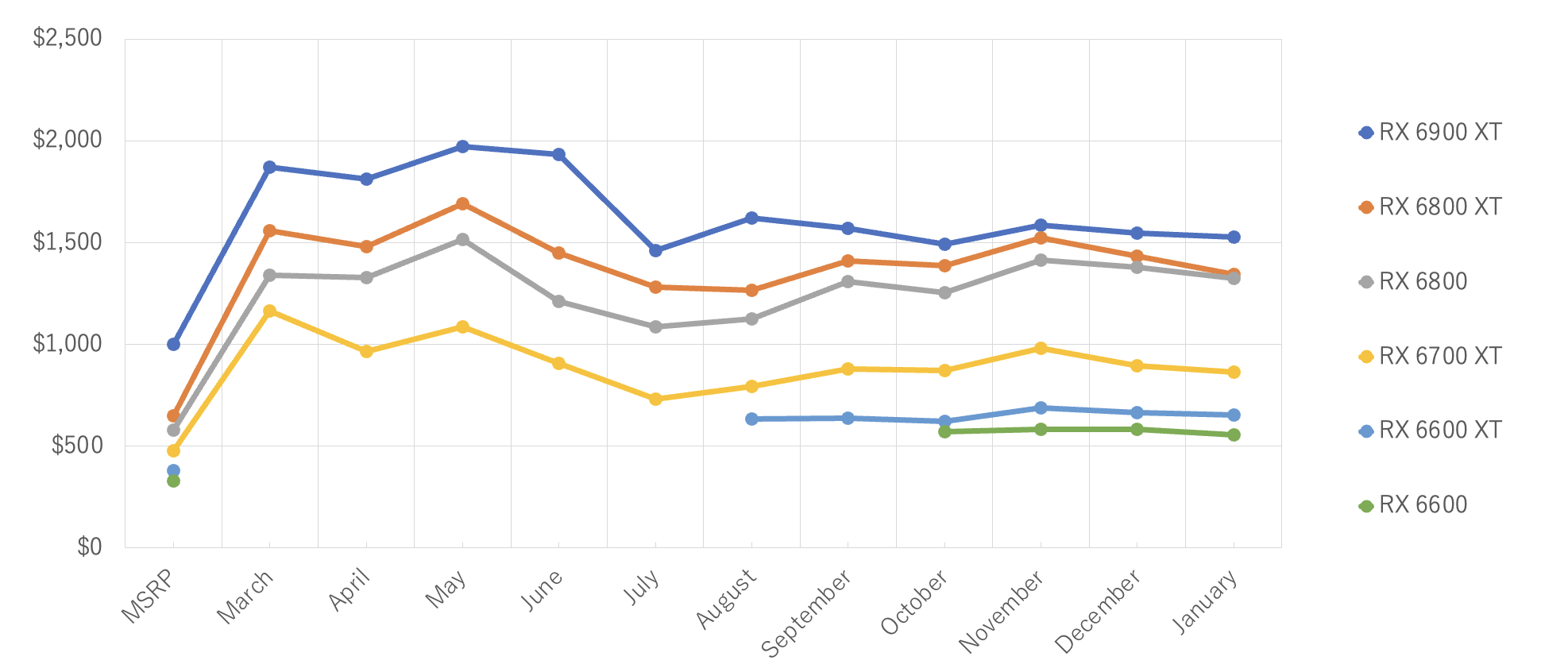
AMD GPUs also saw a price decline, although the volume of AMD cards sold this month was very low compared to previous months, which might be a supply issue or listings simply being overpriced. Like on the Nvidia side, every AMD card saw price drops, though the average drop of 3% is slim. AMD GPUs continue to be better bang for buck options than their Nvidia counterparts from a performance standpoint, for example the 6700 XT at $870 is much cheaper than the RTX 3070’s $1,080 price and actually a bit lower than the 3060 Ti sitting at $935.
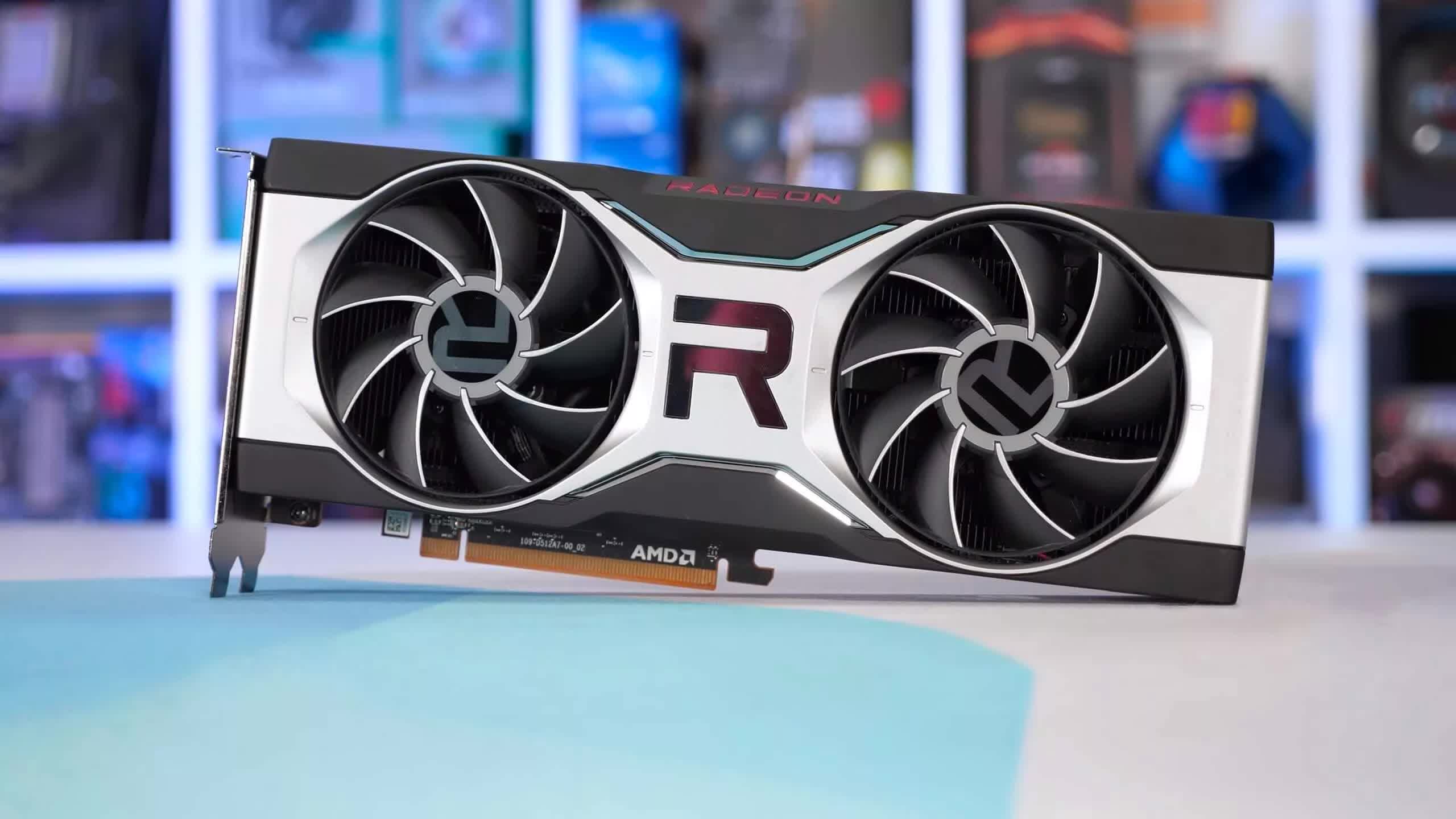
| MSRP | eBay Average Price November | eBay Average Price December | eBay Average Price January | Current Price Inflation | Price Increase Dec to Jan | |
|---|---|---|---|---|---|---|
| Radeon 6900 XT | $1,000 | $1,585 | $1,548 | $1,527 | 53% | -1% |
| Radeon 6800 XT | $650 | $1,524 | $1,435 | $1,346 | 107% | -6% |
| Radeon 6800 | $580 | $1,413 | $1,381 | $1,327 | 129% | -4% |
| Radeon 6700 XT | $480 | $980 | $897 | $866 | 80% | -3% |
| Radeon 6600 XT | $380 | $689 | $664 | $654 | 72% | -2% |
| Radeon 6600 | $330 | $584 | $582 | $557 | 69% | -4% |
| Average | 85% | -3% |
The average price drop for AMD GPUs this month was similar to December. Like on the Nvidia side, prices are well down from their peak in May, but still inflated. We’re looking at about 80% over the MSRP right now. It’ll be interesting to see how the upcoming RX 6500 XT impacts this, which we’ll begin tracking next month.
Used GPU Pricing
As for the used market, the pricing trend is similar to the new market. For Nvidia’s GeForce 20 series, the prices of all GPUs fell, if only marginally. The overall decline is 4% on average, a decent result, though we’re yet to see Turing GPUs return to their MSRP in a lot of cases, the closest we have right now is the RTX 2080 sitting at $730 for a used GPU.
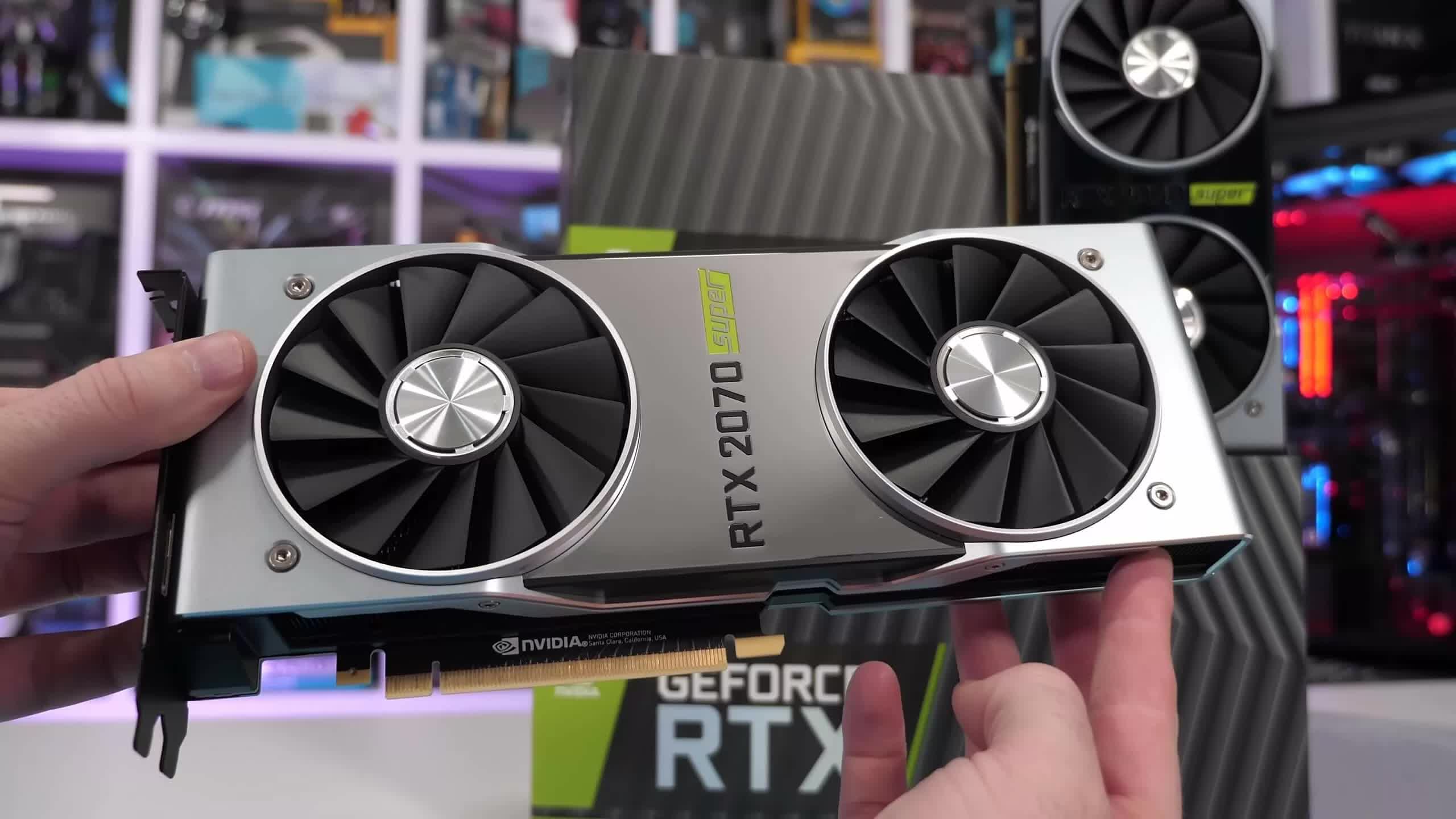
| MSRP | eBay Average Price November | eBay Average Price December | eBay Average Price January | Current Price Inflation | Price Increase Dec to Jan | |
|---|---|---|---|---|---|---|
| GeForce RTX 2080 Ti | $1,000 | $1,182 | $1,187 | $1,148 | 15% | -3% |
| GeForce RTX 2080 Super | $700 | $841 | $820 | $809 | 16% | -1% |
| GeForce RTX 2080 | $700 | $772 | $777 | $730 | 4% | -6% |
| GeForce RTX 2070 Super | $500 | $768 | $737 | $726 | 45% | -1% |
| GeForce RTX 2070 | $500 | $700 | $677 | $660 | 32% | -2% |
| GeForce RTX 2060 Super | $400 | $732 | $688 | $648 | 62% | -6% |
| GeForce RTX 2060 | $350 | $543 | $527 | $499 | 43% | -5% |
| Average | 31% | -4% |
The GeForce 16 series saw a respectable price reduction of 6% month on month, after a 2% reduction last month, and a 5% increase in November. As these are still Nvidia’s current generation mainstream GPUs, prices are heavily inflated, though it’s good to finally see some movement in GTX 1650 prices. Nvidia is set to launch the desktop RTX 3050 later this month at a $250 MSRP, so you would expect this to have an impact on street prices for this market as we expect it will fall somewhere around $500 new.
| MSRP | eBay Average Price November | eBay Average Price December | eBay Average Price January | Current Price Inflation | Price Increase Dec to Jan | |
|---|---|---|---|---|---|---|
| GeForce GTX 1660 Ti | $280 | $497 | $483 | $445 | 59% | -8% |
| GeForce GTX 1660 Super | $230 | $520 | $512 | $473 | 105% | -8% |
| GeForce GTX 1660 | $220 | $417 | $393 | $378 | 72% | -4% |
| GeForce GTX 1650 Super | $160 | $315 | $306 | $303 | 90% | -1% |
| GeForce GTX 1650 | $150 | $263 | $273 | $247 | 65% | -10% |
| Average | 78% | -6% |
Pascal GPUs from the GeForce 10 series also saw price reductions, except for the highest tier models where pricing was flat. The GTX 1060 3GB saw a big price reduction, possibly in response to the impending RX 6500 XT, though it’s still being sold used for its launch MSRP of $200. The GTX 1060 6GB is the only Pascal card currently being sold above its original price, which goes to show its continued popularity.
| MSRP | eBay Average Price November | eBay Average Price December | eBay Average Price January | Current Price Inflation | Price Increase Dec to Jan | |
|---|---|---|---|---|---|---|
| GeForce GTX 1080 Ti | $700 | $697 | $666 | $665 | -5% | 0% |
| GeForce GTX 1080 | $600 | $508 | $461 | $467 | -22% | 1% |
| GeForce GTX 1070 Ti | $450 | $462 | $465 | $441 | -2% | -5% |
| GeForce GTX 1070 | $380 | $416 | $403 | $368 | -3% | -9% |
| GeForce GTX 1060 6GB | $250 | $326 | $308 | $292 | 17% | -5% |
| GeForce GTX 1060 3GB | $200 | $235 | $231 | $199 | 0% | -14% |
| Average | -3% | -5% |
Some of the clearest evidence of a price correction due to a decrease in mining profitability comes from the Radeon RX 5000 series. These cards are very good at mining and the insane level of price inflation was much attributable to mining performance. But the more closely a GPU is linked to mining, the more heavily the price fluctuates with changes in profitability and that’s certainly the case here, with an average decrease in GPU prices of 10% this month. A GPU like the 5700 XT remains too expensive for gaming, but it’s seen a 9% drop this month after an 11% drop on December.
| MSRP | eBay Average Price November | eBay Average Price December | eBay Average Price January | Current Price Inflation | Price Increase Dec to Jan | |
|---|---|---|---|---|---|---|
| Radeon 5700 XT | $400 | $1,007 | $900 | $815 | 104% | -9% |
| Radeon 5700 | $350 | $920 | $868 | $759 | 117% | -13% |
| Radeon 5600 XT | $280 | $663 | $623 | $571 | 104% | -8% |
| Radeon 5500 XT 8GB | $200 | $442 | $428 | $387 | 93% | -10% |
| Average | 104% | -10% |
A similar situation is seen on AMD’s older GPUs. Cards like Vega and Polaris are highly sought after for mining and we’re looking at a 10% drop in pricing this month as well. The two 4GB cards in this chart, the 580 4GB and 570 4GB are going to be interesting competition for the RX 6500 XT at its supposed $200 MSRP. We wouldn’t recommend the 8GB cards for gamers right now, the GTX 1060 6GB is a much better choice, but prices are falling.
Two More GPUs Incoming
There are a few additional GPU launches expected this month like the Radeon RX 6500 XT and GeForce RTX 3050. It’ll be interesting to see how they impact the market, and we’re hoping the result will be better than Nvidia’s 12GB launches.
The good news for those following the GPU market closely is that street prices dropped month on month in January on the scalper market. In addition, we observed a higher than usual amount of unsold listings, and good availability in retail stores — at inflated prices, of course. Some GPUs are approaching their lowest prices in about a year. Pricing isn’t great, but there are some positives to take away.
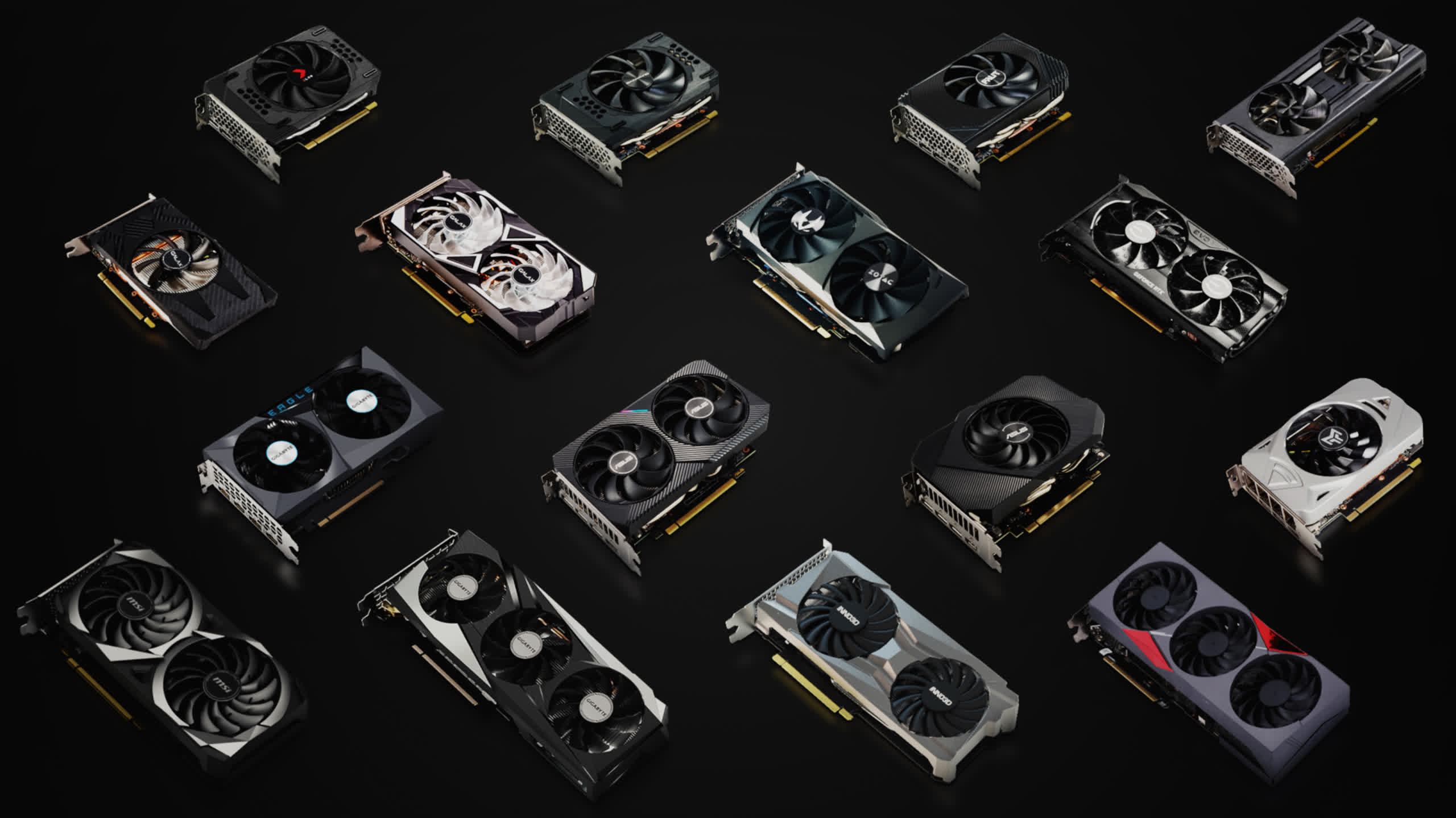
The main driver behind these declines is the cooling crypto market. The current trend of prices drops and a decrease in mining profitability for popular coins has been ongoing for a few months now, one of the longest periods of cooling in the past 12 months.
Like everything crypto, it’s unclear whether this trend will continue next month (and anyone that says they can answer that question accurately is kidding themselves), but if the trend does continue, GPU prices will also keep falling. It’s that simple. We’ll continue monitoring prices and reporting back in the months to come for as long as it makes sense to do so. Until the next one.
Shopping Shortcuts:
Source link


